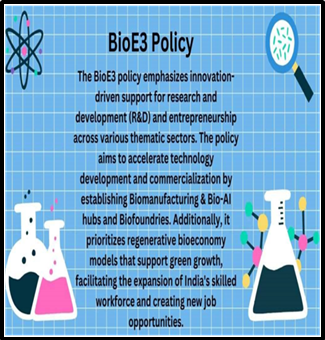India has Recently Released the BioE3 policy which intends to Bring Revolution in Biotechnology
Why in the news?
BioE3 has been initiated by Dr Jitendra Singh to make India as a Hub for Bio tech to become a developed nation by 2047.
source:drugscontrol.org
About the Policy Release and Vision:
- Union Minister Dr. Jitendra Singh has launched the BioE3 policy, and government framed biography abounding with ambition to actualize India as the apostle of the Industrial Revolution.
- The policy is in consonance with the development policies such as ‘Net Zero’ and Mission LiFE that has been formulated by the Union Cabinet.
- It is envisaged that it would be a tool for developing India by the year
Policy Highlights and Impact:
- The BioE3 policy focuses on six themes: sustainable bio-based chemicals and material, functional food, precision bio-pharmaceuticals including therapeutic, climate smart agriculture, carbon dioxide capture and sequestration and futuristic marine/ space exploration.
- The PPP (Public Private Partnership) model is critical to policy and of critical importance to the policy implementation matrix given its emphasis on industry participation and employment creation.
Status of India’s Bioeconomy Growth:
- Global Ranking: According to data, India is ranked among the top 12 biotechnology destinations across the world and the 3rd in the Asia-Pacific.
- Bioeconomy Value: The bioeconomy of India achieved a size of USD 130 billion in 2024.
- Economic Role: Biotechnology contributes greatly in the vision of India to become a 5 trillion dollar economy by the year 2024.
- Biopharmaceuticals: India for instance is the world’s biggest supplier of generic medicines and vaccines and is also a pioneering producer of biosimilars.
- Bio-Agriculture: India ranks 5th in the world for its amount of organic agricultural land and has a good scope for an increase of this market.
- Bio-Industrial & BioServices: Competitive especially in areas of contract manufacturing, research and clinical trial, with several plants that have been approved by the US FDA.
| Key Objectives and Impact of BioE3 Policy and Vigyan Dhara:
BioE3 Policy Focus Areas:
Vigyan Dhara Scheme:
Impact:
Government Initiatives in Biotechnology:
Associated Article:https://universalinstitutions.com/indias-bioeconomy-policy-a-global-vision/ |




